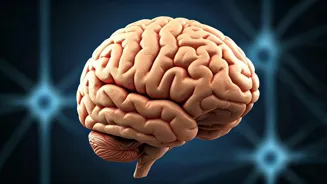BDNF Unveiled
BDNF, or Brain-Derived Neurotrophic Factor, is a crucial protein in the brain, often dubbed the 'miracle molecule.' It's pivotal for neuron growth, survival,
and the overall health of the brain. Think of BDNF as a fertilizer for your brain cells, fostering their growth and resilience. It supports neuroplasticity, which is the brain's remarkable ability to reorganize itself by forming new neural connections throughout life. Increased levels of BDNF are associated with enhanced cognitive function, improved memory, and a reduced risk of neurodegenerative diseases like Alzheimer’s. Essentially, BDNF acts as a guardian, protecting and promoting a healthy, vibrant brain. Therefore, activities that elevate BDNF levels are highly beneficial for long-term brain health and optimal cognitive performance.
Exercise Connection Explained
While many are aware that exercise benefits overall health, fewer understand its direct impact on the brain. Specifically, one type of exercise is particularly effective at increasing BDNF levels. Resistance training, or strength training, has been shown to significantly boost BDNF. This includes exercises using weights, resistance bands, or even body weight. The mechanics are fascinating: when you perform resistance training, the body responds by releasing various growth factors, including BDNF. This happens because the physical stress of resistance training stimulates muscle cells, which in turn, trigger the release of these beneficial factors. The key is to consistently challenge your muscles. This doesn't mean you need to spend hours in the gym; even short, focused resistance training sessions can be highly effective at stimulating BDNF production and supporting brain health.
Resistance Training Benefits
Beyond the BDNF boost, resistance training offers a range of other benefits that contribute to overall brain health. It enhances cognitive function, improving memory, focus, and processing speed. Additionally, resistance training helps improve mood and reduce stress and anxiety, indirectly benefiting the brain. Physical activity, in general, is also known to improve blood flow to the brain. This enhanced circulation provides the brain with more oxygen and nutrients, which is vital for optimal function. Moreover, resistance training can also help protect against age-related cognitive decline and reduce the risk of neurodegenerative diseases. It does this by promoting the growth and maintenance of brain cells and strengthening the connections between them. Regular resistance training can act as a powerful tool for preserving cognitive health throughout life.
Making it Practical
Incorporating resistance training into your routine doesn't require complex equipment or extensive gym time. Begin by selecting exercises that target major muscle groups, such as squats, push-ups, lunges, and rows. Start with a manageable number of repetitions and sets, gradually increasing the intensity as you get stronger. Experts often recommend incorporating resistance training at least twice a week. Focus on proper form to avoid injuries. You can use free weights, resistance bands, or even your own body weight. Consistency is vital; aim to make resistance training a regular part of your lifestyle. Remember, even short, focused sessions can yield significant benefits. Pairing your resistance training with a balanced diet and adequate sleep will amplify its positive effects on your brain health and overall well-being.














